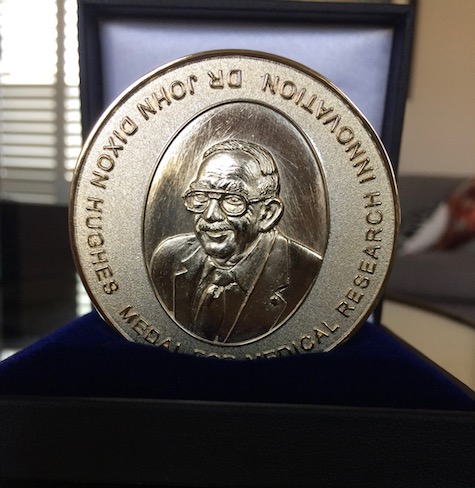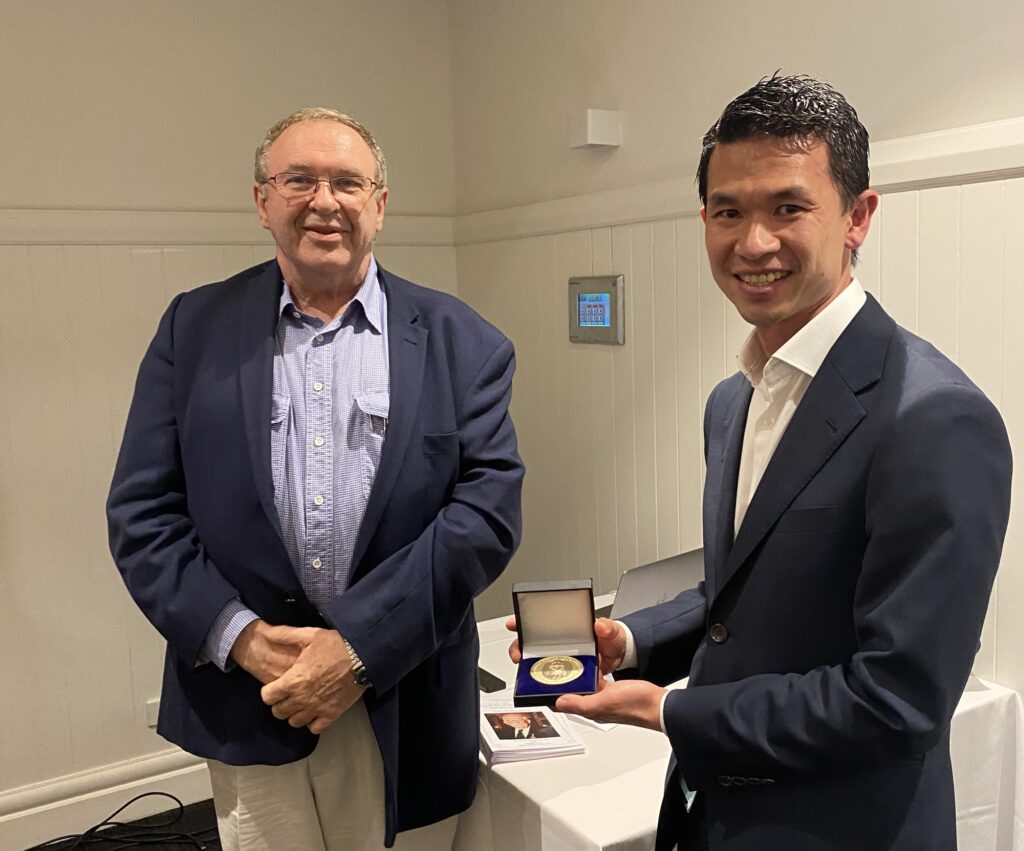The National Foundation for Medical Research and Innovation (NFMRI) is pleased to offer the Dr John Dixon Hughes Medal for Medical Research Innovation every two years to a researcher under the age of 45 for outstanding contribution towards the development and advancement of a biomedical innovation related to the nature, prevention, diagnosis, treatment and incidence of disease and other health problems that have a significant impact on the health of humans.

About the Award
The Award is named after our longest-standing Director and former Chairman of our Research Advisory Committee, Dr John Dixon Hughes OAM, who was a founding member of the Foundation in 1977. Dr Dixon Hughes OAM was an astute consultant general surgeon with over 55 years experience. He remained an active, dedicated and passionate board member until his passing in 2022 and was an avid believer in the potential for philanthropy to support and advance innovation.
The medal will be awarded with a prize of $50,000. The prize will be in the form of a grant to support the research activities of the recipient. Nominations will be called for every other year and are treated as commercial-in-confidence.
The medal will be awarded to the researcher judged to be responsible for the best biomedical innovation and development paper published, patent taken out, or commercial-in-confidence report in the previous two calendar years. Innovations will include Australian research and discoveries into new medicines, vaccines, biologicals, devices, tools or diagnostics.

2023 Medalist: Dr Joshua Ooi, Monash University
Targeted regulatory T-Cells (Tregs) to treat lupus
In a landmark 1st author Nature paper, Dr. Ooi showed that regulatory T cells (Tregs) specific for self-proteins can be used to specifically treat the cause of autoimmune diseases, like lupus. Dr. Ooi then started his own independent laboratory and devised a platform that can genetically engineer GMP-ready Tregs specific for any self-protein. These cell products are called Targeted Tregs.
Dr. Ooi has applied his unique platform to develop Targeted Tregs specific for lupus. Lupus patients suffer from multi-organ dysfunction due to an autoimmune response that attacks its own tissues. Using lupus patient blood samples to devise a novel humanised mouse model of lupus, Dr. Ooi has shown that the lupus-specific Targeted Treg product effectively stops the pathogenic autoimmune response and effectively cures disease.
In addition to the lupus-specific Targeted Treg product (which led to a large research collaboration and commercialisation deal with a multinational pharma company) , Dr. Ooi has developed and filed patents for Targeted Tregs specific for other severe autoimmune diseases including Sjogren’s syndrome and autoimmune vasculitis.
NFMRI CEO, Dr. Noel Chambers, together with the Board and Research Advisory Committee of NFMRI congratulate Dr. Ooi for his impressive achievements and Dr. Chambers added that “Dr. Ooi was a stand-out candidate for this Medal”.
Judging and Selection for the Medal
The Directors of the Foundation will judge the award with support from the Research Advisory Committee.
Demonstrable translation of research is a prerequisite for consideration.
The award may be shared if the judges agree that more than one applicant is equally worthy of the award. If no suitable applications are deemed worthy of the award, the Foundation may elect not to offer the award in any particular year.
Nominations for the 2026 medal are now open and should include:
- A completed nomination form,
- A cover letter signed by the nominator outlining:
- Importance of the innovation;
- Role of the researcher and evidence of involvement with the innovation;
- Progress towards translation and/or commercialisation; and
- A short non-confidential disclosure of the innovation (the type suitable for industry/investor review).
- Evidence of translation and progress. This may include media, IP and partner/investor/company information, letters and links to websites.
- Open links to published published papers with the recipient as lead author associated with the innovation. If the relevant publications are not available online, please attach a copy with the nomination; and
- Two written referees reports.
Please click here to download a nomination form
Nominations, together with supporting documentation from the candidate, should be submitted via this link. Submissions sent by email may not be considered.
Self-nominations are not accepted. The nominee must be under the age of 45 as at 1 October 2026. Nominations must be for an individual rather than a team.


